Schroeder Family Asphalt Diversifies its Paving
BY Sandy Lender
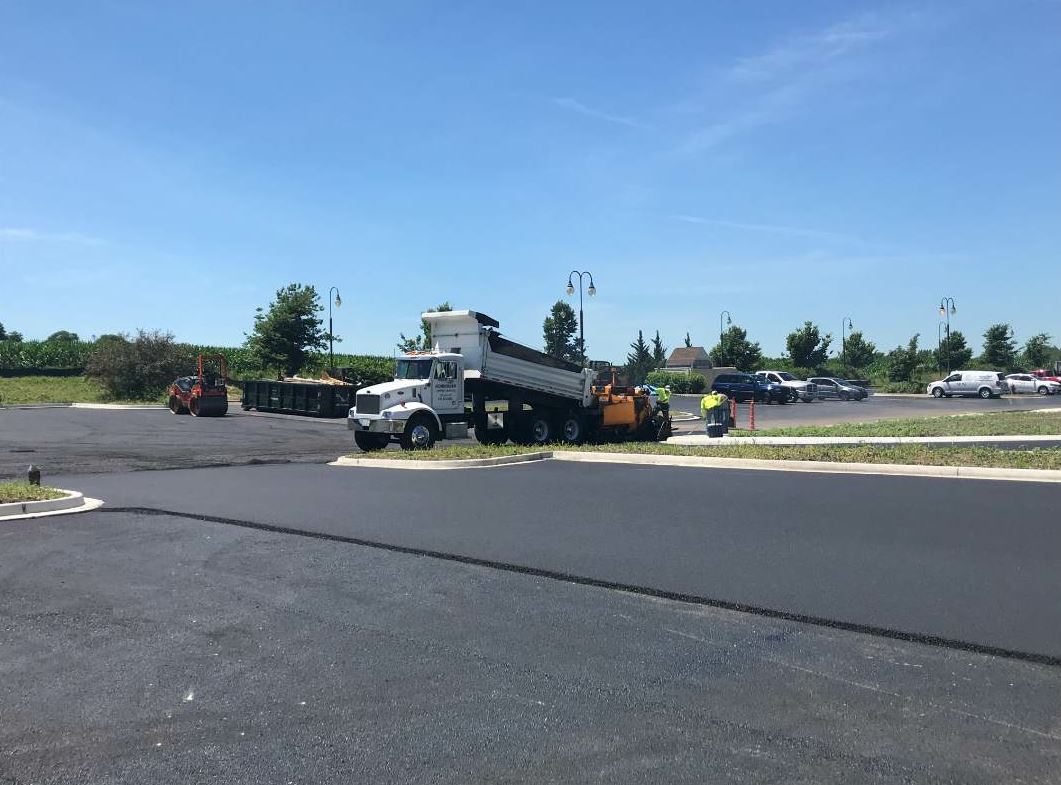
They kick it old school to advance asphalt and business in Marengo, Illinois.
Management at Schroeder Asphalt Services Inc. is proud to be a veteran-owned, family company, working with 45 employees these days and growing in a competitive area south and west of Chicago. Brent Schroeder is the managing partner and loves what he does.
“I love all aspects of our industry. I love the hunt for the job and then seeing the job developed from start to finish. It’s rewarding taking a bare field or any lot and turning it into this beautiful piece of ‘black glass’.”
He’s in the office, personally, by 5:00 in the morning because he’s devoted to the job, to the company, to everyone’s success. They’ve got at least seven crews to schedule—three paving crews each day, two to three milling crews a day, an excavation crew, and a stone crew. The three paving crews consist of a mainline crew on streets, a parking lot crew and a patch crew.
“We do not use any scheduling software,” Schroeder explained. “We use a simple, large, dry erase board. It’s a daily ritual to sit down with my longtime superintendent, John Rocco, and adjust our board every day at 2:00. We have a two-week tentative schedule laid out for all seven crews. Things in our business change daily with weather, equipment breakdowns and asphalt plants being busy. We keep the eraser close.”
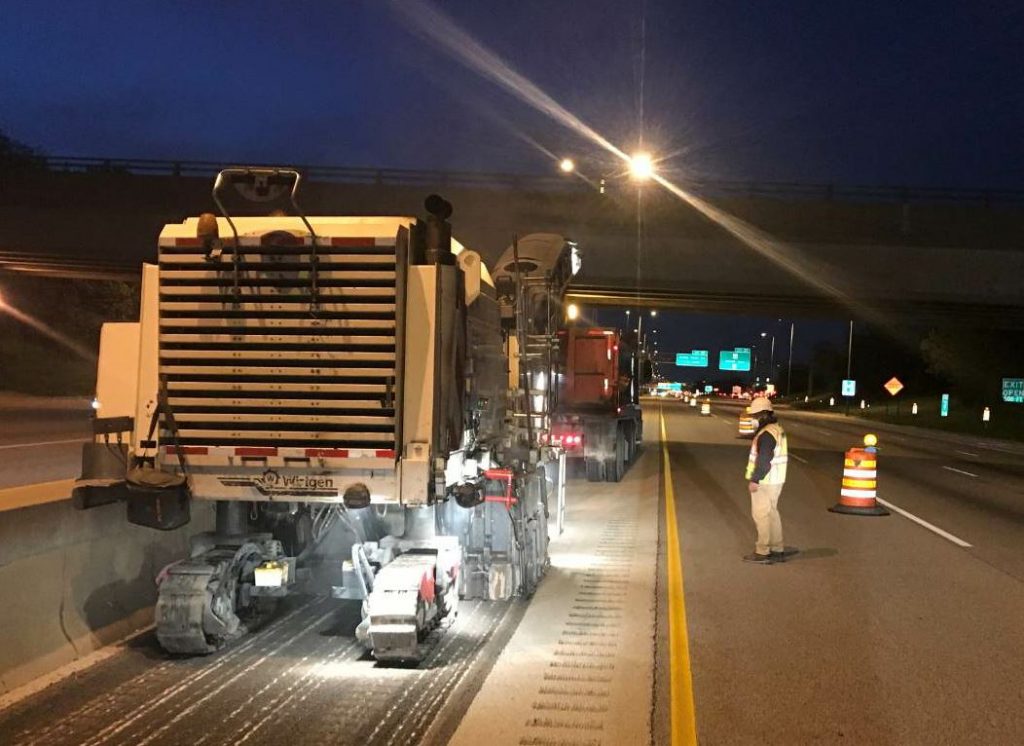
As part of safety training talks and reminders, the Schroeder team goes over how to use all the proper signage on the job. This includes ample use of barricades, cones and signage to help the motorist understand where they should be and, more importantly, where they shouldn’t be, Brent Schroeder explained.
In 2018, they placed approximately 250,000 tons with the crews working from Rocco and Schroeder’s ritual at the board. With that kind of scheduling and paving commitment going daily, you might think they would consider making their own mix, but Schroeder has a loyalty answer to that.
“We have such a great relationship with a supplier partner who’s been friends with my dad since childhood. That’s been another big contributor to our success—relationships with vendors.”
The work ethic and loyalty Schroeder brings to the company started with his parents.
He explained that his father, Ronald Schroeder, had been involved with heavy equipment all of his life, and helped him get his job at Harry Kuhn right out of high school. A business would blossom from this experience.
“This was a company started by my family,” Schroeder said. “My mom was a nurse, my dad a superintendent over heavy equipment, my sister worked for the Jenny Jones TV show, and I had an idea to go into business for ourselves. Mom and Dad stayed working until my sister Jennifer and I could build something that could support the entire family.”
They started in 1997 with sealcoating and striping. “Our first year in business, we did $176,000 in sealcoating and patching with one employee, a small dump truck and roller. Twenty-two years later, we employee about 45 great people that we look at like family. We have about 100 plus pieces of equipment between trucks, trailers and heavy equipment.”
Schroeder said the phone was ringing off the hook that first year with potential customers wanting their driveways paved. He invested in a Layton box in 1998 and a brand new LeeBoy 8500 paver in 1999 to add paving to the company’s services.
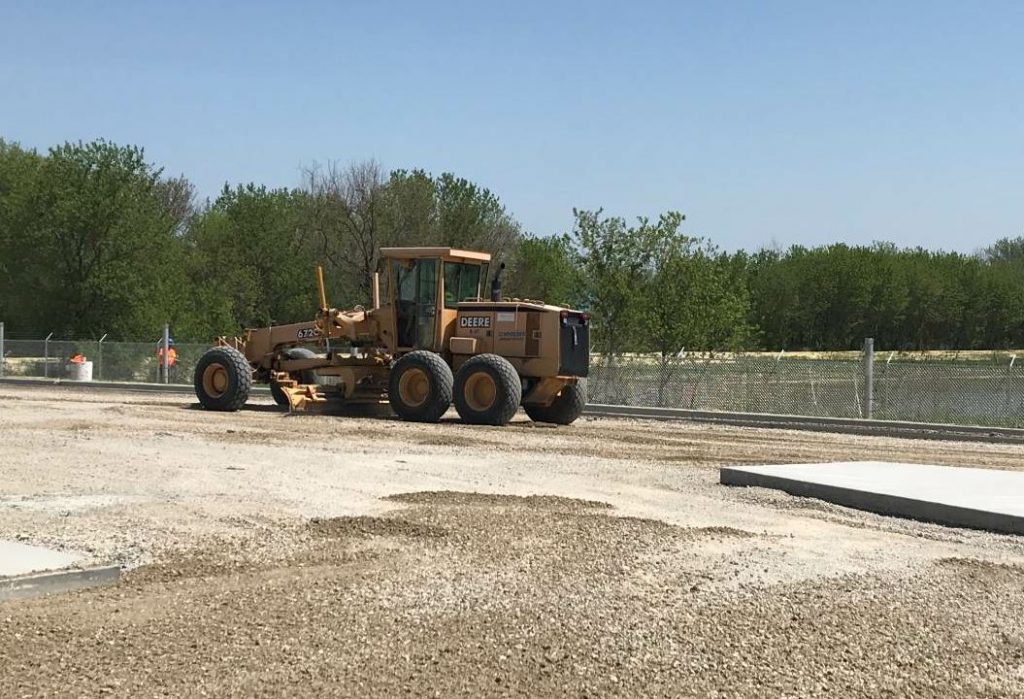
Schroeder’s managing partner loves all aspects of the asphalt industry. For him, it’s rewarding to start with a bare field of dirt and turn it into a smooth asphalt lot people can use.
“We only used the Layton box a year, seeing that a self-propelled paver was much more productive and easier to use. Since that first LeeBoy, we have purchased probably 10 from our great equipment dealer Casey Equipment.”
Paving driveways ushered in a new business model.
“We started to do driveways for the major Chicagoland home builders in many areas. Being that the Chicagoland area is union with most trades, these were union projects and we had two choices. We could either not sign with the union and not get this work, or sign with them and get more work. We chose to sign up with them, which opened a new door for us in the type of work we could pursue like more home builders and parking lot work instead of the private homeowner work we were doing.
“My biggest outside influence was my competition. I’m never complacent and always strive for more. I wanted to be better and bigger than my competition, and had to make money to get there and get a crew that could help. I started with one subdivision doing five driveways a day. I thought I was killing it until I heard that some of the other driveway guys I was competing with were doing 15-20 a day. Within a year I had five more subdivisions and we were doing the 15-20 drives a day as well. I had finally assembled a good crew and by the end of 2005 we had 32 subdivisions for eight major builders.”
Members of the industry will remember the economy went through some changes after 2005, and Schroeder was watching for signs of downturn. He expanded the crews to develop variety in the work they could take on.
“In 2005, we were paving 4-5,000 driveways a year. We all know nothing lasts forever and we were worried that the economy would burst sooner or later and our driveway work would diminish with the burst in the economy. We talked as a family and got bonded to do public work.
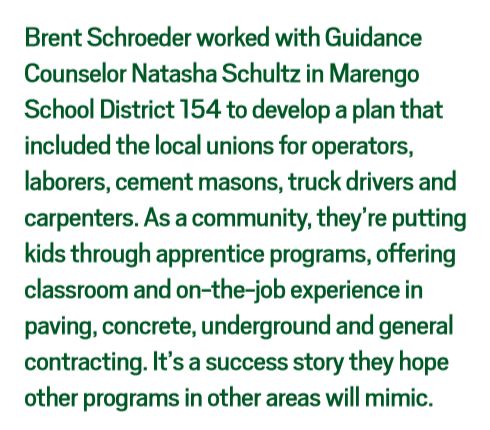
“We were starting to bid schools, park districts, and libraries for any and all asphalt work they had while continuing to do our driveway work. We were successful with many bids and found this work paving parking lots easier than the driveway work. Nervous to totally leave our roots, we managed to keep the driveways going and start a parking lot crew as well. We purchased more equipment and started to do minor underground work and take on bigger lots. Fast forward to 2007.”
When the economy dropped, the 15-20 driveways Schroeder’s paving crew handled per day dropped to three to six per day, he shared. The company couldn’t afford to pave the smaller quantity at the same price point as the larger quantity, and sought a price increase from the customers. Schroeder explained that both customer and client understood each other’s position, but couldn’t always meet the financial change.
“We parted ways with most of these builders. With this work gone we had to step up our game. We purchased our first road paver, which was a Roadtec, from Plote Construction, who was our asphalt supplier. Schroeder Asphalt bid its very first road program in 2007 for the city of Woodstock as a general contractor. It was this job that gave us the courage to step out of our comfort zone and do what we had never done before, which was paving roads. This meant buying a milling machine, bigger rollers and again having a crew who understands how to pave roads. Our first road project for Woodstock was a success.”
Proud Projects
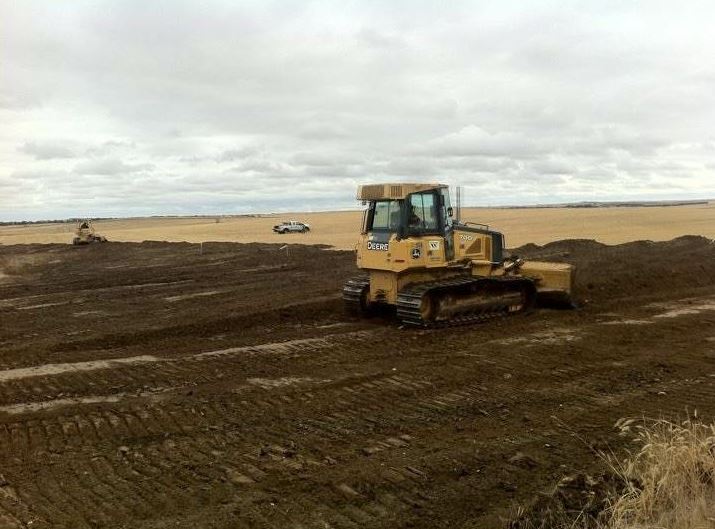
Schroeder’s managing partner loves all aspects of the asphalt industry. For him, it’s rewarding to start with a bare field of dirt and turn it into a smooth asphalt lot people can use.
Getting larger projects meant beefing up the portfolio. Schroeder was ready to take care of that.
“The Illinois Department of Transportation prequalification is basically your resume on your history of work, your personnel, your equipment and your financials. We can’t bid any street work for IDOT or any village or city without this. This is broken down by every category of work that any job might have. Schroeder Asphalt is prequalified in excavation, asphalt milling, aggregate bases, drainage, asphalt paving, miscellaneous concrete and striping work. Depending on your experience, it will tell you how much in dollar value you’re able to do based upon your history. So your total value of your prequal, with all the categories, dictates how much of this work you can have at any one time. We renew this every year. Your numbers will go up and down depending on the work you did, equipment sold or bought, and financial strength. The reason for this prequal is to determine the amount and type of work you can handle from a workforce perspective, an equipment perspective and financial strength at one given time.”
With all the necessary paperwork in hand, the company worked full steam ahead. One of the larger projects that Schroeder is particularly proud of took place in Hampshire, Illinois, in late 2018. The owner, Loves Truck Stop, required a Geo Grid fabric placed under 8 inches of CA6 road stone and 23,000 tons of IDOT N90 binder course, with an IDOT N90 surface course on top. To add a little spice, the 11,000 tons of N90 surface includes polymer and fibers.
“This job was challenging because they went back and forth on the type of asphalt mix to use,” Schroeder explained. “Not all mixes are the same from state to state. Loves and their engineer, Terra Con, worked with us and my contact, Dave Verdico, at Plote Construction on creating all mixes that met Loves’ specifications. This was a large job and has 34 acres of asphalt.”
Another element Schroeder saw as a challenge was “the clock was ticking with weather coming in.” With engineers discussing mixes, the contract didn’t get resolved until the third week of October.
“Typically by Thanksgiving the plants like to be closed in this area,” Schroeder said. “The weather was wet and cold in the end of October and some of November. That created more work for us being that the sub base was failing and we had about 8,000 tons of 12-inch undercuts that were needed after our proof rolls. So we had about five to six weeks to do 8,000 tons of undercuts, 52,000 tons of stone and 23,000 tons of binder.
“The store is scheduled to be open in 2019, but before our asphalt plants typically open in late April. We already had agreed that if we didn’t get the surface on, that was okay, but the binder course had to happen.
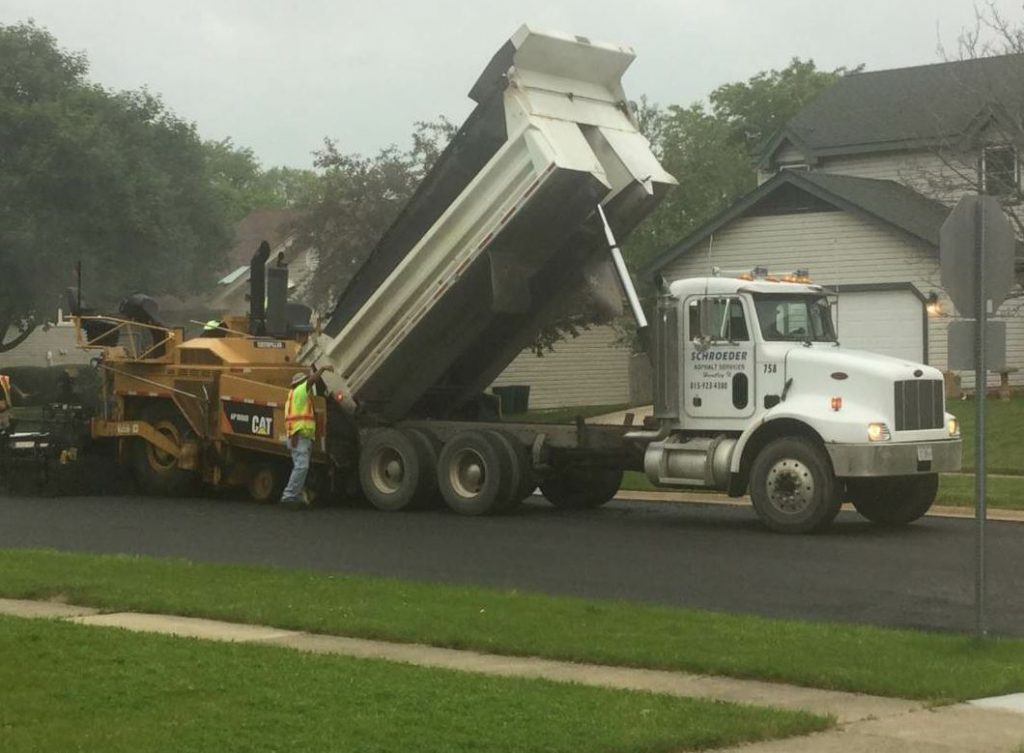
By the end of 2005, Schroeder Asphalt had 32 subdivisions for eight major builders, paving about 4,000 to 5,000 driveways a year. But they weren’t resting on that success. They took on public work and more to diversify.
“We fought weather and many challenges right to the end and were able to get all the binder down except 1,000 tons by the day before Thanksgiving. The following weekend, we got about 9 inches of snow. We didn’t think we would get that last 1,000 tons, but we moved equipment in to remove the snow off the gravel and we made it happen. This project was a success with getting all that stone trucked in by Beverly Materials and Sunset Logistics. The plant opening on Saturdays and Sundays and staying open late during the week was huge. We give a big thanks to Billy Wagner of Plote Construction for that, and of course to our loyal crews for making that happen. Very hard working people we have.”
The two grading foremen on that job were Carlos Bucio and Frank Bradon. The paving foreman was Matt Roeder.
“The process took one crew digging out the soft base, another crew placing and compacting the 12 inches of 3-inch CA1 rock, then two base crews putting thousands of tons of CA6 stone down to grade, and finally the paving crew covering up behind them. It was a great process to watch and everyone worked very well together.”
Safe Success
The completion of the Woodstock reconstruction and the Hampshire projects are only two examples over years of growth in paving and other expertise for Schroeder Asphalt. The company brings in workers who are willing to stay the course and work as a safe, quality-minded family.
“We have seven foremen and they all have been with us 11 years or more,” Schroeder explained. “We try to do more with less and this way of thinking makes us more competitive in our marketplace. There are a lot of days we expect the impossible from our crews and never do they say ‘no’ to us. Sometimes the impossible can’t get done, but we know that every crew gives it their all everyday.
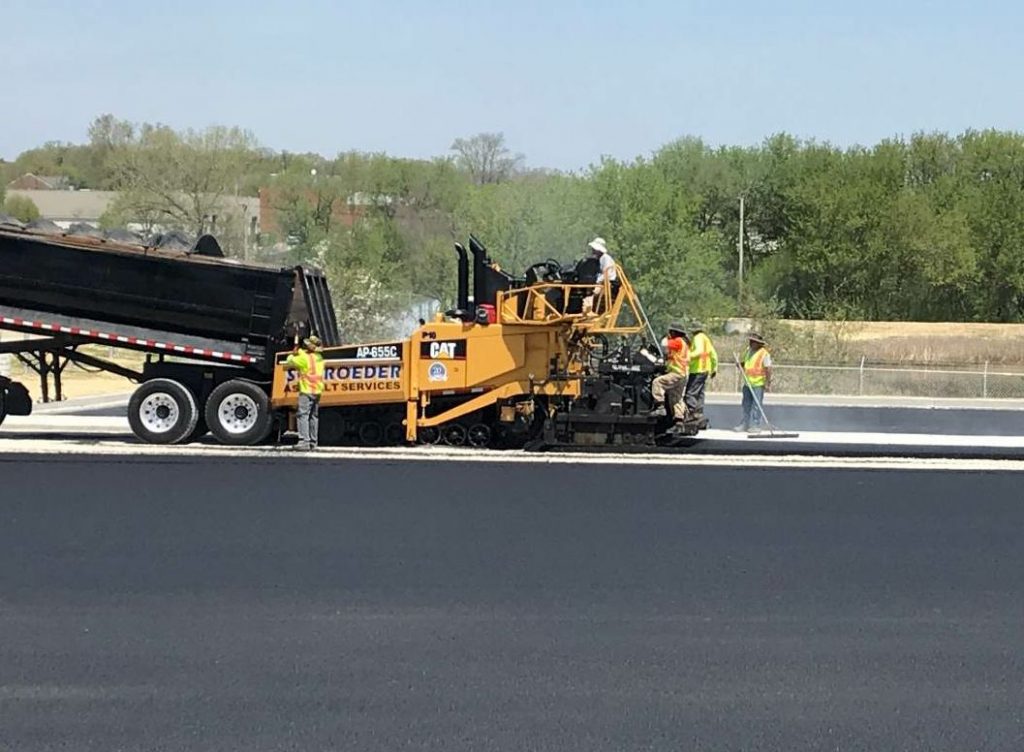
The company has at least seven crews to schedule during a 24-hour period. The three paving crews consist of a mainline crew on streets, a parking lot crew and a patch crew.
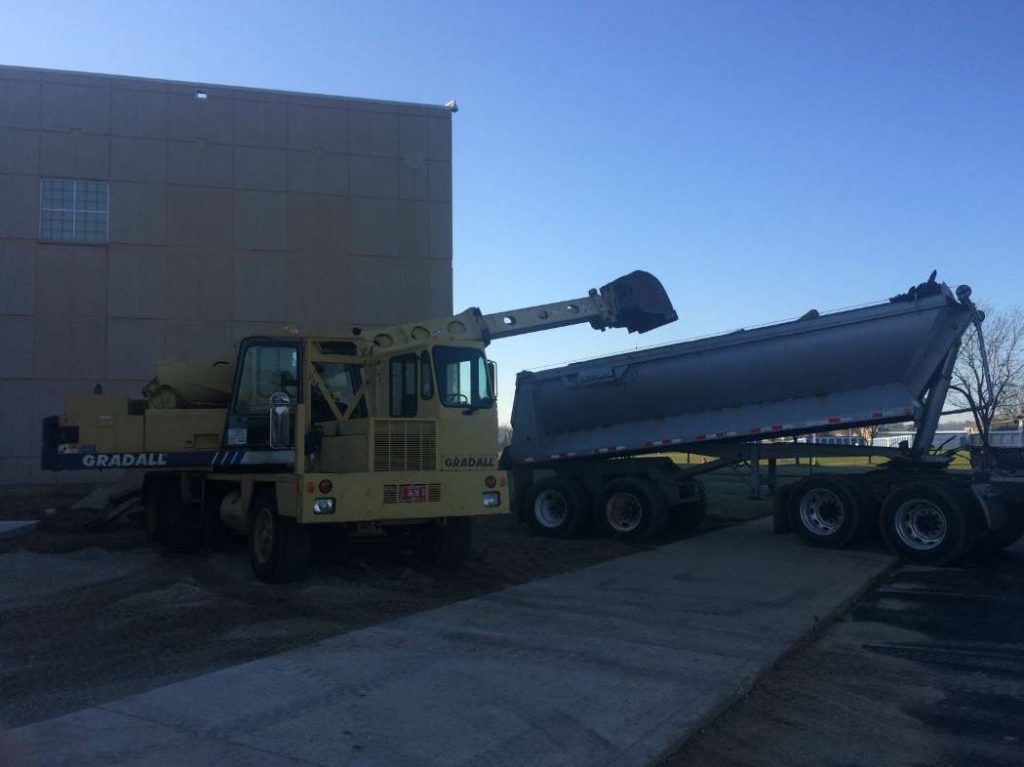
Of the seven crews to get scheduled, one is an excavation crew.
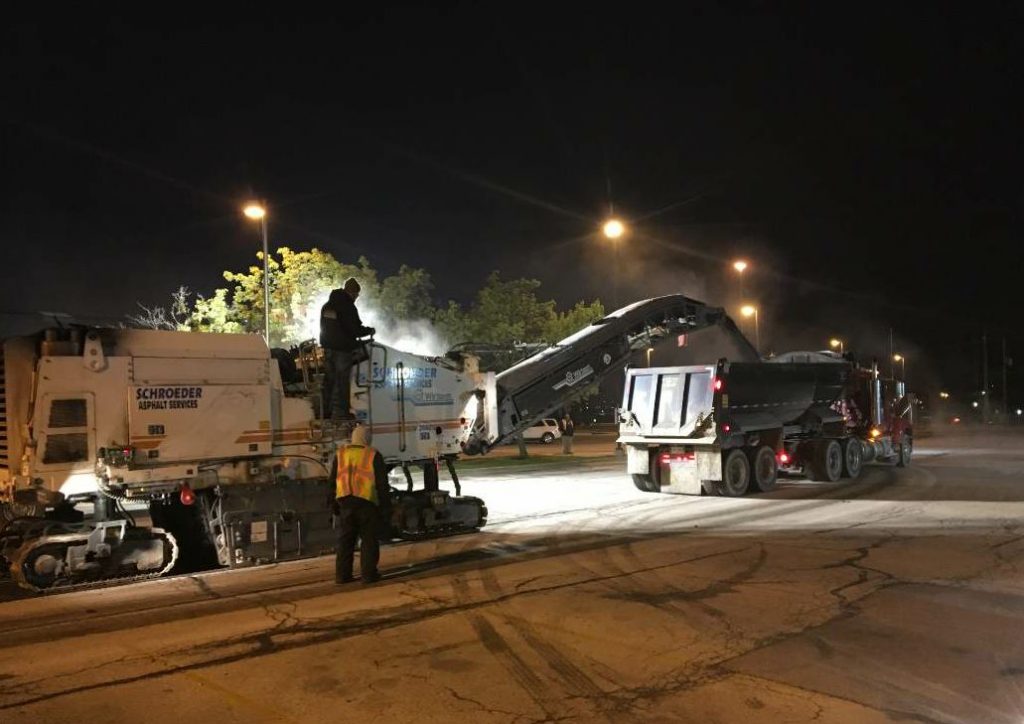
Schroeder and Rocco schedule two to three milling crews a day, and that can include night work.
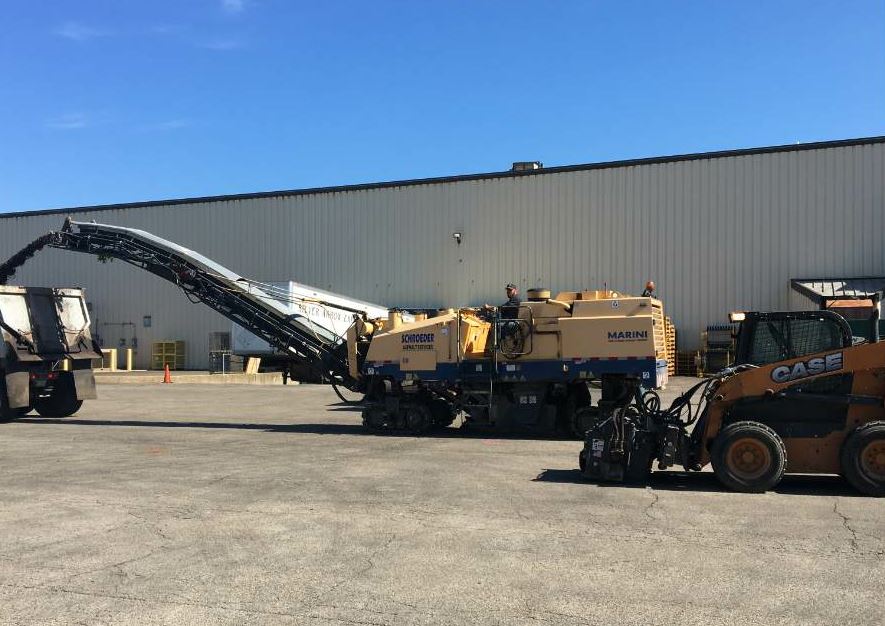
Schroeder and Rocco schedule two to three milling crews a day, and that can include night work.
“I think one of the things that has made us successful is we listen to our people and try different things that they suggest. We have an open door policy here and we want to hear not only the good but the bad as well. We can’t fix what we don’t know. This could be about a certain piece of equipment, a job, setting up tool trucks differently or even how we bid a job. There are times that we will ask the guys for their opinions when we are looking for an edge on a job we are bidding if we can try to perform the ‘impossible.’ I was raised that people are not a dime a dozen. Never ask an employee to do what you won’t do yourself. You have an investment in people and turnover costs you money.”
To bring people into the business, Schroeder works with the local school district.
“About a year ago I was driving and looking at our jobs and watching our guys work. I sat there looking at one of my guys who had been with us 19 years, another guy 16 years, another guy 15 years. It hit me that some of these guys are nearing retirement soon and that skill isn’t something you can replace overnight.
“But it isn’t just the asphalt industry that faces this. It’s every trade from the concrete guys, carpenters, plumbers and electricians. When I look at the younger generation constantly on their phones, computers and any other electric gadget that fits in their hands, I can’t help but think, who is going to be the ‘boots on the ground’ in 10-20 years to continue to build our infrastructure? Kids these days are pressured to go to college because it has become instilled in them that you need a degree to be anything in the workplace. However, college isn’t for everyone.”
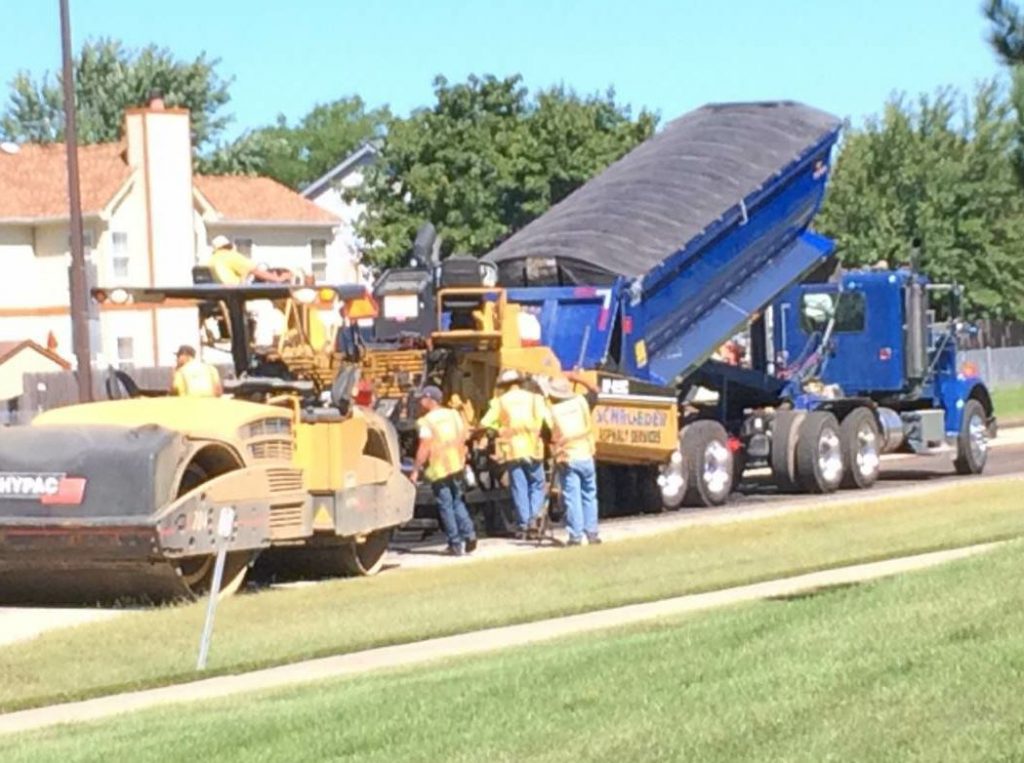
By the end of 2005, Schroeder Asphalt had 32 subdivisions for eight major builders, paving about 4,000 to 5,000 driveways a year. But they weren’t resting on that success. They took on public work and more to diversify.
“I approached Marengo School District 154 and set up a meeting with Natasha Schultz who is the guidance counselor. I asked her what the school does for their non-college bound kids. She stated that they tried to put a program together years ago and it couldn’t get traction. I asked her if she would like my help and she gladly accepted. We developed a plan that I would contact the local unions for operators, laborers, cement masons, truck drivers and carpenters to see if they would have interest in putting these kids through their apprentice programs, which offers classroom and on the job experience. I then reached out to other paving, concrete, underground and general contractor companies that I knew and asked if they had interest in sponsoring a student who might have interest in the type of work that their company represents.
“There was an overwhelming response from the companies as well as the unions. In just one year we have electricians, plumbers, local banks and insurance companies now part of this program. If there is an interest from a student in a field that we currently do not have participation from, we try to find it. I’m happy to say that we have hired a couple of these kids and hope that they will have the same passion that we have in our industry.
The lack of young tradesmen and women in many vocational industries is a huge issue and we are hoping that other programs in other areas will soon mimic what we are building to protect and keep our industry alive in the years to come.”
Bringing employees in means keeping them safe, of course, and Schroeder pays attention to this important detail.
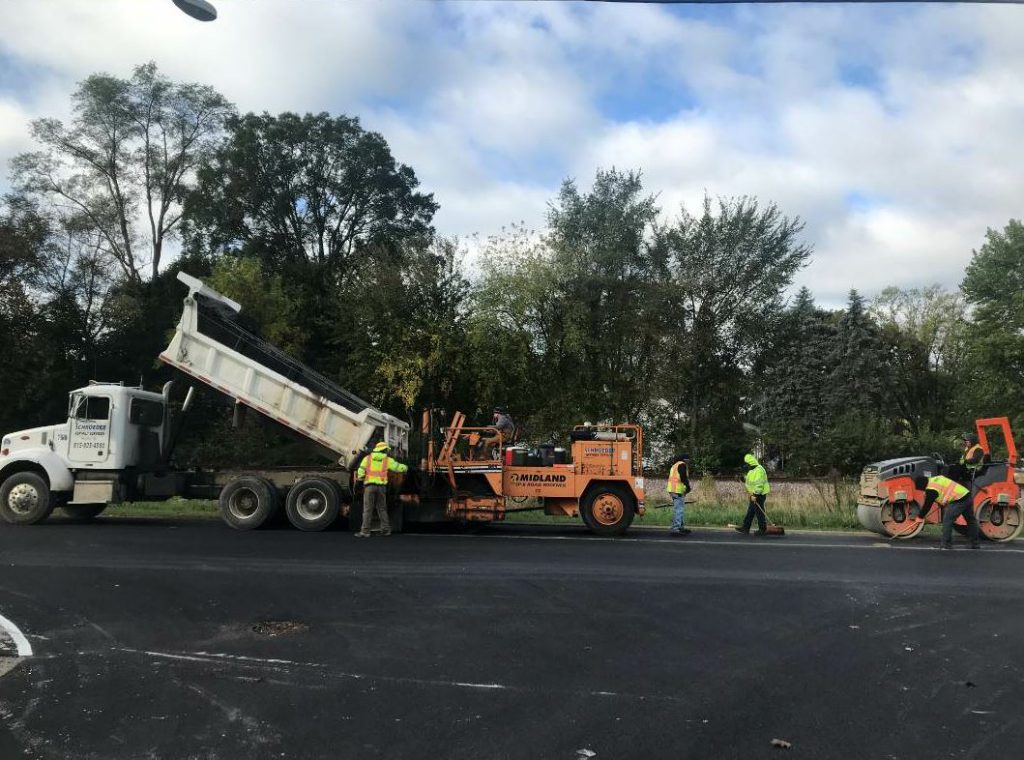
“The Midland road widener was bought brand new about 7 years ago,” Brent Schroeder said. “We use this on many 7-foot or under asphalt or gravel installations.” This picture shows the crew using the Midland on a City of South Elgin project in 2018. “We were installing a 3-foot-wide gravel shoulder next to the newly paved road. This is a great machine and can be used for many aspects in our industry. We like it because it’s smaller than a Blaw Knox, which lets us get down narrow streets or tight areas and has the ability to get up and over the curb for those projects that have paving or aggregates behind the curb. This machine is user friendly and can be used to put down a lot of material with a small crew. Our employees love it when we can use this machine instead of the shovel!”
“We hold an annual safety breakfast. At this breakfast we have a professional come in and go over scenarios that some of our people have been in and some that could happen. When our guys are working with their backs to traffic they have to trust that the certified flaggers are watching everyone. We tell those flaggers, don’t just look at the car but make eye contact with the person driving it.
“We also perform random drug testing on the employees who drive a company vehicle.
“Finally, making sure the employees have proper signage, safety gear and a good plan to execute the job is what keeps everyone returning home to their families at night.
“We do weekly tailgate talks. We try to implement the talk around what we are currently doing on a job or in relation to the weather. When we get these hot days here we discuss staying hydrated and getting in the shade when possible. When that first frost hits, we discuss making sure you’re careful climbing up and down the equipment since it’s slippery. All of our equipment is labeled with “do’s” and “dont’s” because when you work around it everyday you get comfortable. When you get comfortable and let your guard down, that’s when accidents happen. Always be aware.”
Schroeder gives credit for safety and success to all the elements of the business. It’s an industry effort to keep all the crews staffed. It’s a Schroeder team effort to keep all the crews busy with safe, quality work during boom times and lean times.
“When I look back at our success, there are several factors. Our people are number one, from the estimating team to the guys in the field, to the mechanics keeping everything going, to the women in the office billing and collecting, and finally to all our families for dealing with the long hours that this industry demands from us.
“Our suppliers are another reason for our success with great pricing and service that they give us and we are able to pass this along to our valued customers. Our vendors that we get parts and supplies from have worked with us when we needed things ASAP. We don’t schedule breakdowns and when you need it, you need it now. Downtime will kill your profits. We all work hard and are very passionate about this business. You can find us there at 5:00 in the morning every morning and usually until 6-7:00 at night. Anyone can own a company, but in this industry you will never do it alone.”
Brent Schroeder worked with Guidance Counselor Natasha Schultz in Marengo School District 154 to develop a plan that included the local unions for operators, laborers, cement masons, truck drivers and carpenters. As a community, they’re putting kids through apprentice programs, offering classroom and on-the-job experience in paving, concrete, underground and general contracting. It’s a success story they hope other programs in other areas will mimic.
